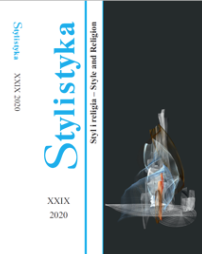Рождество и крещение как символы поэтического творчества: евангельские мотивы в поэзии русского метареализма
Christmas and Baptism as symbols of poetic creativity: Evangelical motifs in the poetry of Russian metarealism
Author(s): Olʹga SeverskaâSubject(s): Language and Literature Studies
Published by: Uniwersytet Opolski
Keywords: Russian metarealism; Evengelical motif; Christmas; Epiphany; intertextuality; poetic imagery
Summary/Abstract: Christmas and Baptism as symbols of poetic creativity: Evangelical motifs in the poetry of Russian metarealism and the 21st centuries. The author considers the “Epiphany” and “Christmas” images in the lyrics of Yevgeny Daenin, Ivan Zhdanov, Alexei Parshikov, Sergey Solovyov, correlating them both with the text of the Holy Scripture and with the poetic tradition of “Christmas verses” of the 19th century and two boundary periods (the 19th-20th and the 20th-21st centuries), in which the search for the “painful and unsteady” image of God is manifested with a particular force. Traditionally, in poetry there is an intimization of Christmas and Epiphany: so, these events are not perceived as being external, but as internal, occurring in a person’s soul. This is true of all Russian contemporary poetry. And metarealism is no exception. The article sequentially explores (using the hermeneutic method, semantic, intertextual and content analysis) verbal images and motifs associated with Baptism, Epiphany and Christmas. In the interpretation of the evangelical stories, metarealists proceed from the ideas of the divine Word-Logos, embodied in words. Baptism and Epiphany are associated with the Word’s Appearance to the People, their baptism in the Speech as a River, which at the same time becomes synonymous with Christmas and Nativity, the birth of the “mortal” word and the beginning of its Way of the Cross. Poetry is perceived by metarealists as climbing Golgotha, “the crucifix of the throat”. The poet has three hypostases in their texts: the “wise Thief” who ascends to “paradise” by God’s will, but is capable of performing the sacrament of baptism with the “verb fire”; “Carpenter”, “Joseph”, stepfather of the “God-born baby”-text; builder, governor of Heavenly Jerusalem and leader of the “Heavenly Host” of words. Analyzing the concept of Speech as a “Homing,” the author comes to the conclusion that metarealists are not so much engaged in “God-seeking” as they are developing M. Heidegger’s theory of language as a “house of being” and of existing and being.
Journal: Stylistyka
- Issue Year: 2020
- Issue No: XXIX
- Page Range: 329-343
- Page Count: 15
- Language: Russian

